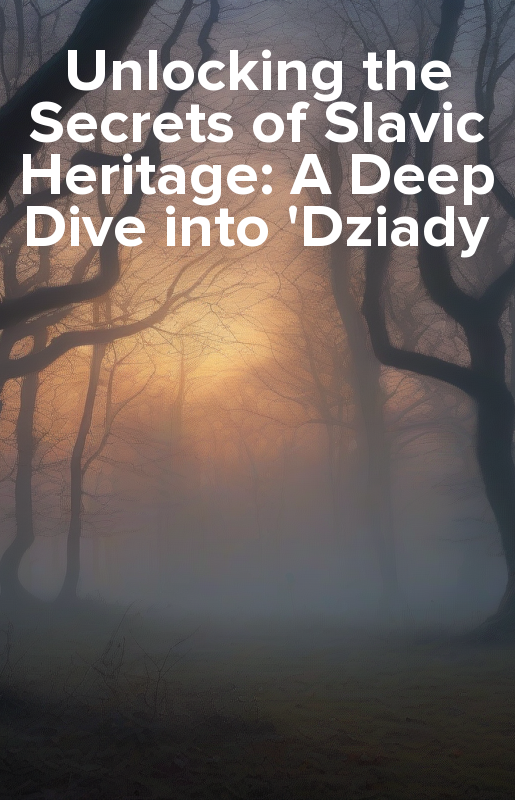Table of contents for ebook and audiobook: „Unlocking the Secrets of Slavic Heritage: A Deep Dive into 'Dziady”
Here's the translation to English:
Dziady with edited cover by Greg Adam Mickiewicz Greg
Part 1: Introduction to the World of Slavic Folklore
Chapter 1: The Significance of Dziady in Slavic Culture
- 1.1 Definition and Origins of Dziady
- 1.2 Historical Context of Dziady Celebrations
- 1.3 Cultural Significance of Dziady in Modern Times
- 1.4 Comparison with Other Slavic Folklore Traditions
- 1.5 The Role of Dziady in Shaping Slavic Identity
Chapter 2: The Life and Work of Adam Mickiewicz
- 2.1 Early Life and Education of Adam Mickiewicz
- 2.2 Literary Career and Major Works
- 2.3 Influence of Slavic Folklore on Mickiewicz's Work
- 2.4 Mickiewicz's Views on Nationalism and Slavic Unity
- 2.5 Legacy of Adam Mickiewicz in Modern Literature
Part 2: Exploring the Themes and Motifs of Dziady
Chapter 3: The Cycle of Life and Death in Dziady
- 3.1 The Concept of Ancestor Worship in Slavic Culture
- 3.2 The Role of Death in Shaping Slavic Identity
- 3.3 The Symbolism of Nature in Dziady
- 3.4 The Impact of Christianity on Slavic Funeral Rites
- 3.5 The Continuity of Slavic Funeral Traditions
Chapter 4: Love, Family, and Community in Dziady
- 4.1 The Importance of Family Ties in Slavic Culture
- 4.2 The Role of Women in Slavic Society and Dziady
- 4.3 The Significance of Love and Relationships in Dziady
- 4.4 The Impact of Social Change on Slavic Family Structures
- 4.5 The Evolution of Slavic Community and Social Bonds
Chapter 5: Supernatural Beings and Magical Realism in Dziady
- 5.1 The Concept of Supernatural Beings in Slavic Folklore
- 5.2 The Role of Magic and Sorcery in Dziady
- 5.3 The Symbolism of Animals and Nature in Dziady
- 5.4 The Impact of Christianity on Slavic Views of the Supernatural
- 5.5 The Continuity of Slavic Magical Realism
Chapter 6: The Role of Language and Music in Dziady
- 6.1 The Importance of Language in Shaping Slavic Identity
- 6.2 The Role of Music in Slavic Funeral Rites and Dziady
- 6.3 The Significance of Folk Songs and Ballads in Dziady
- 6.4 The Impact of Language and Music on Slavic Cultural Heritage
- 6.5 The Evolution of Slavic Language and Musical Traditions
Part 3: Analyzing the Literary and Cultural Significance of Dziady
Chapter 7: Dziady as a Literary Masterpiece
- 7.1 The Literary Merit of Dziady
- 7.2 The Influence of Dziady on Modern Literature
- 7.3 The Symbolism and Imagery in Dziady
- 7.4 The Use of Language and Style in Dziady
- 7.5 The Cultural Significance of Dziady in Modern Times
Chapter 8: Dziady in the Context of Slavic Culture and History
- 8.1 The Historical Context of Dziady
- 8.2 The Cultural Significance of Dziady in Slavic Society
- 8.3 The Impact of Dziady on Slavic Cultural Heritage
- 8.4 The Role of Dziady in Shaping Slavic Identity
- 8.5 The Evolution of Slavic Culture and Traditions
Chapter 9: Dziady and the Concept of Nationalism
- 9.1 The Role of Dziady in Shaping Nationalist Sentiment
- 9.2 The Impact of Nationalism on Slavic Culture and Traditions
- 9.3 The Significance of Dziady in Modern Nationalist Movements
- 9.4 The Tension between Nationalism and Multiculturalism
- 9.5 The Evolution of Nationalist Sentiment in Slavic Culture
Chapter 10: Conclusion: The Enduring Significance of Dziady
- 10.1 The Timeless Themes and Motifs of Dziady
- 10.2 The Cultural Significance of Dziady in Modern Times
- 10.3 The Legacy of Adam Mickiewicz and Dziady
- 10.4 The Future of Slavic Culture and Traditions
- 10.5 The Enduring Impact of Dziady on Literature and Culture
Note: Dziady is a Polish term that translates to "Forefathers' Eve" in English. It is a literary work by Adam Mickiewicz, a Polish poet and playwright, and is considered one of the most important works of Polish literature. The work is a dramatic poem that explores the themes of Slavic identity, culture, and history.

